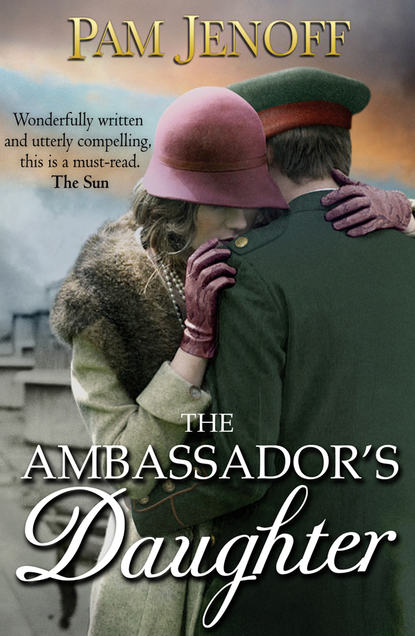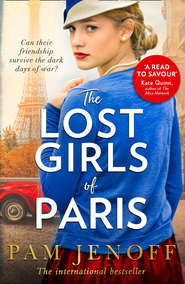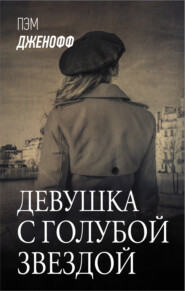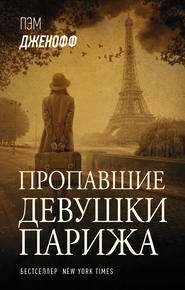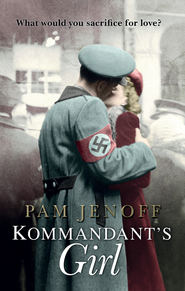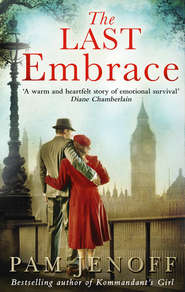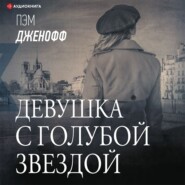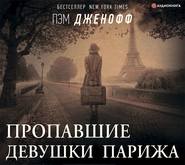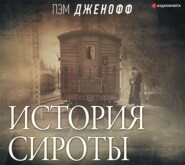По всем вопросам обращайтесь на: info@litportal.ru
(©) 2003-2024.
✖
The Ambassador's Daughter
Настройки чтения
Размер шрифта
Высота строк
Поля
“That isn’t the same.”
“I know.” I turn to gaze out the window at the courtyard below. “I feel so differently now.”
“Or maybe you feel the same, but you’ve changed and so those feelings are no longer enough.”
I consider this. Part of me has always sensed that there were differences. I recall a conversation Stefan and I had once about my mother. I’d found an old playbill from a show she’d done in Morocco and shown it to him. “How exciting,” I remarked, “to have traveled the world.”
But Stefan had looked at me blankly. With everything he wanted right here in Berlin—his family and me—he had no desire to leave. “It must have been terribly difficult,” he replied, “not to mention dangerous.”
I could see it in his eyes, too, the day he left for the army. “You’ll get to go so many places,” I’d offered as we stood on the platform and said goodbye, trying to force optimism into my voice. “Belgium, Holland, maybe even France.” But Stefan had never wanted to leave in the first place, whereas I could not wait to go. No, the differences were there even before the war, but it had taken the years apart to make me perceive them clearly. Now they are magnified, not just by time, but the ways in which I had changed, as well.
“Maybe,” I reply to Krysia. “We were so young and four years apart feels like a lifetime. Sometimes he seems more like an idea than a person. I hate feeling this way. And he needs me.”
“A sense of obligation is no way to start a life,” she presses.
“Loyalty is important.” My voice sounds tinny and weak.
“So is happiness. Would you want someone to marry you for such a reason?”
“No, of course not.” But I am not lying wounded in a hospital bed, with no prospect of a future. I am suddenly annoyed. I barely know Krysia. Why is she asking me such things? “I should go.” I stand and put on my coat. “Thank you for the coffee.”
I half wish she will try to stop me, but she nods, rising. “Thank you for calling. I hope to see you again soon.”
Outside it is warmer now, the late-morning sun taking away some of the chill. The sidewalks are now lively with pedestrians, merchants and deliverymen unloading crates from lorries. As I make my way toward the metro, Krysia’s questions about Stefan prickle at me. I hear her voice, exhorting me to see the world now, while I still can. A thousand objections roar through my brain: I can’t leave Papa. I can’t travel alone.
Nothing has changed—my problems loom as large as ever. But despite my earlier annoyance, it felt good to share my fears about Stefan and a life together with Krysia, to verbalize to somebody the thoughts and feelings I’d barely dared to acknowledge to myself for so long. And Krysia confiding her story of Emilie helped, as well. Learning that someone as strong and self-assured as Krysia also wrestles with the past and the right thing to do makes me feel somehow less alone. She seems to enjoy my company, though perhaps I am simply a proxy for the daughter she so desperately wants to know but cannot. Squaring my shoulders, I start down the street with a lighter gait than I’ve had since before the war.
Forty minutes later, I reach our suite at the hotel. I open the door and stop. The curtains are drawn and only faint daylight filters in. A rustling noise at the desk startles me and I jump. Papa is here, hunched over the desk in the darkness, when he should have been at the ministry. “Papa?” Alarmed, I rush forward. He does not move. I put my hand on his shoulder, fearful that it is his heart and the worst has happened. “Papa, are you well?”
He straightens but his expression is dazed as though he does not see or recognize me. Before him on the desk sits a newspaper. “There’s been an attempt on Clemenceau’s life.” I pick up the paper. My breath catches as I take in the photograph of the would-be assassin. The dark-eyed boy from the La Closerie des Lilas stares back at me.
“The attacker possessed information from the conference that was not public, information that prompted him to act.” Papa drops his head to his hands once more. “And I’m afraid they’re going to blame it on me.”
PART TWO Versailles, April 1919
4
I peer out the window down the road at the Hôtel des Réservoirs. The six-story building, with its aged yellow facade and arched doorway, stands behind hastily erected barbed wire, giving it the feel of a fortress or prison, depending upon whether one is to be kept in or out. Either way, it looks as if the German delegation is to be quarantined, defeat a virus that no one wants to catch. Apple blossoms frame the hotel in a defiant lush pink.
The road leading to the guarded hotel gate is lined three deep with onlookers, reporters and photographers and townspeople and those who had packed the trains down from the city. There is no official party as there had been when Wilson arrived, no military band or other pageantry to herald the Germans’ arrival—just hordes of the genuinely curious, waiting to see those who are to be held responsible for the world’s suffering.
I turn back into the room where Papa sits working at his desk, oblivious to the spectacle taking place across the road. Our apartment in Versailles is located not in a hotel, but a tall row house that has been converted into apartments to accommodate the sudden influx. It is laid out much like our previous quarters in the city, two bedrooms adjoined by a common space. Everything, from Papa’s piles of books to the photograph of my mother on the mantelpiece, is in the same location as in Paris. It is as if we travel in a shell, I’d decided when we first settled in, re-creating the identical living environment for ourselves in each city. But the rooms here are smaller and oddly shaped, the parlor something of a trapezoid, walls with faded flowered paper slanting inward from the windows.
“They should be here soon,” I say. Papa does not answer. He had not wanted to be here today—or at all for that matter. He had tried to lure me away with an excursion to Paris. But I had insisted that we stay, despite his derisiveness of what he called the “circus of shame.” He does not stand at the window himself, but busies himself at the desk. How can he not look?
The topic had come up at a dinner party three weeks earlier when it was announced that the Germans had finally been summoned to the conference. “You’ll move over to Versailles now, of course, and stay with the delegation?” someone asked Papa. Until that point we had enjoyed our neutral status, not being identified too closely with any one camp, including the defeated. But when a telegram came from the head of the delegation inviting us to relocate, Papa could avoid it no longer. So we left the city for this dreary little suburb of Versailles, though he still commutes almost daily to the conference proceedings at the ministry in Paris.
Our apartment is just across the road and down a bit from the hotel. The location, close by the German residence but not within, reflects the delicate role Papa must play. The conference does not trust him because he is German. The German delegation will surely not accept Papa because he has been part of the conference. We are an island.
“I’m going to market,” I say, unable to stand the confinement of the apartment any longer and eager to get a closer view. Unlike the hotel in Paris, there’s no kitchen to deliver our meals and the town’s few remaining restaurants are dismal affairs, so it falls to me to procure what we need.
I hold my breath, waiting for Papa to see through my excuse—the shops are likely to be closed now with the arrival. But he does not. Papa has been more preoccupied than ever these past few months since the attempt on Clemenceau’s life. Though the French prime minister recovered quickly and the story faded from the newspapers, it continued to hang over Papa and me, a silent dagger.
I almost told Papa that night that it was my fault. “Quite a shock,” he’d remarked. “Clemenceau will be fine, even joked as they were taking him to the hospital about the madman’s poor marksmanship. But it is a sobering reminder to us all that even while we are here working toward the new world, there are those who would derail it.” His brow furrowed.
“What is it? Is there something more?”
“Not at all.”
“You don’t need to shield me. I’m not a child.”
He smiled. “No, of course not. I never like to trouble you and give pause to your beautiful smile, even for a moment. It’s just that this may cause trouble for me. Cottin—the would-be assassin—was upset about French opposition to the Pan-Slavic state. We had been trying to keep it a secret so the media controversy would not keep us from getting the matter done. The assassination attempt, the timing of it, gives rise to suspicions that someone had leaked information about the vote.”
“But surely no one could think that you had a role.”
Papa, the only German detailed to the conference, not to mention a Jew, feared himself a likely scapegoat. I watched his face, wondering if he suspected me, or was perhaps even hinting. But he could not imagine that I would have betrayed him in such a fashion. “I appreciate your outrage on my behalf. It will be fine.”
Though the accusations had never become overt, there had been a quiet distancing between Papa and some of the other conference advisors that made our sojourn to Versailles almost a relief.
Studying Papa now, my guilt rises anew. Only I know the truth—that it was my careless remark, overheard at the bar, which gave Cottin the information to act. I have never been good at keeping secrets from Papa and I have struggled for months not to blurt out what I had done, to seek his forgiveness. But he has enough to deal with right now and I won’t strain his health further.
Down on the street, the morning air is warming and a bit stale with gutter stench. Across the road the hulking Versailles palace sits with its endless fountains and gardens, swallowing the tiny town below.
I walk around the side of the apartment building to the garden I planted. When we’d arrived, the dirt patch had been overrun by weeds. “I could tend to it,” I suggested. “Make the place come back to life a little.”
“A fine idea,” Papa said quickly. Gardening, if done properly without too much strain, is an acceptable avocation for women. “Though we’re hardly likely to be here long enough to see things grow.”
“Then it will be here for others,” I replied stubbornly. I’d planted flowers, tulips and other perennials that I hoped would blossom for years even after we were gone, something beautiful to leave behind. One of the plants has fallen, I notice. I dig my hands deep into the soil, savoring the buried warmth. Then I stand too quickly, my hands creating a smear of dirt across my dress.
I make my way down the cobblestone lane in the opposite direction from the crowds at the hotel, in case Papa is watching out the window. I head toward the market, skirting the edge of the park that sits at the end of the street. I have come to know the quiet rhythm of this part of the town through my days here—the old woman who sits at the corner with her poodle as if waiting for a bus that will not come, the two men who appear every morning at seven to slip schnapps into their coffees and sit wordlessly for twenty minutes before getting up and going in opposite directions. Are they brothers, cousins, friends? Was their routine always like this or was it disrupted during the war?
Gazing down the path into the park, I am reminded of Krysia. I’ve not seen her since we came out here. Versailles is at least twenty-five kilometers away from Paris, too far for an impromptu excursion into the city.
Stopping short of the market, where most of the stalls are indeed closed, I double back around the block to the hotel. The crowd has thickened now, a low murmur of expectancy crackling through the onlookers. Moments later, three buses appear on the road, old coaches belching smoke and making such noise that it seems questionable whether they will make the last ten meters of the trip. A truck rides ahead of the buses. It lurches to a stop then dumps a bunch of boxes in the hotel courtyard as unceremoniously as though they are garbage. Studying closer, I can see that it is luggage, once-fine suitcases now covered with dust and grime.
The bus doors open and the German delegation begins to emerge. They are bureaucrats, stooped older men, thin and paunched, bald and bearded, indistinguishable from the other nations’ delegates, but for their low shoulders and downcast eyes. They shuffle forward to face the indignity of sorting through the luggage, each to find and carry his own.
A boy lets forth a jeer. I brace myself for the rest of the onlookers to join him. Instead, the crowd is silent, their eyes boring into the Germans with pure hatred. Insults would have almost been better. This is why Papa sits at his desk, why he cannot bear to watch. This is not peace or even armistice, but rather the thinnest of truces, scarcely concealing the hatred of the war still bubbling beneath the surface.
A man steps from the last coach behind the others. He is younger, I can tell, even beneath the cloak of his naval coat and hat. Papa had mentioned someone military. My first impression is of a hawk. Steely blue eyes take in the crowd. I’m reminded of the soldiers I saw so often on the Paris streets. Even out of uniform I can spot it—the anxiousness, searching the corners for a cellar or other hiding place, as though the air before him might at any moment explode with grenades and mustard gas.
He starts forward, walking with his shoulders squared, seeming to clear the path ahead of him as he goes. Then his head lifts slightly and his eyes flick in my direction and I can swear, though I am one in a crowd of hundreds, he is looking directly at me.
My breath catches. I step back and, as I do, my scarf drops. Suddenly the German breaks from the procession. He steps toward the crowd, which parts. Then he bends down and picks up my scarf and holds it out to me.
I recoil. There is something chilling about him, militaristic and terrifying. Stefan is a soldier, too, I remind myself. But that is different—Stefan is an ordinary man, called into war by circumstances and patriotism. This man is a high-ranking officer, a soldier by nature. I look down, suddenly conscious of the garden dirt on the sleeve of my everyday blouse.
The people around me glare with accusing eyes as if my receipt of this act of kindness somehow makes me complicit. I tilt my head upward but the soldier does not meet my eyes. Should I thank him in German or French? I take the scarf but before I can say anything, the man has rejoined the procession and is gone.





